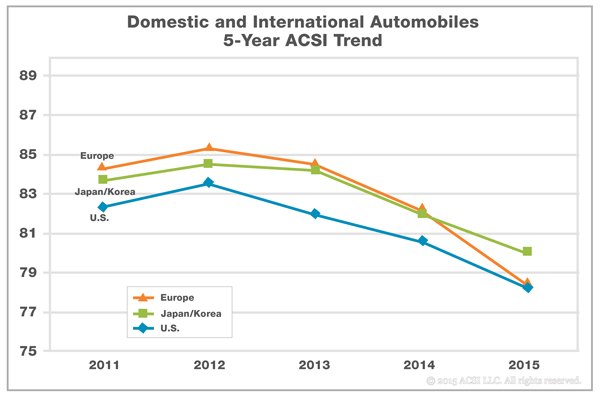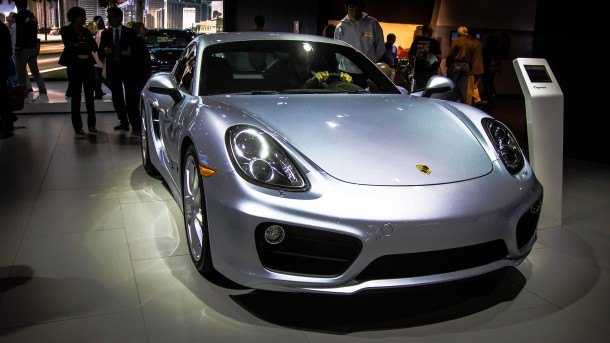#survey
Survey Says: Americans Want Big Range From EVs
And in other news, the sky is blue and water is wet. America is a vast landscape, after all. Eggheads at the professional firm Deloitte have released their 2022 Global Automotive Consumer Study, one which polls respondents from countries around the globe about forward-looking topics in automotive.
One key takeaway? It seems Americans want more EV range than anyone else in the world. A lot more.
Mitsubishi Tries Harder in 2021 J.D. Power Study
Mitsubishi Motors’ third-place ranking in the latest J.D. Power Customer Service Index (CSI) indicates the brand is trying harder to improve the experience for service done under warranty and or customer pay. Up one spot from 2020 among non-premium, mass-market nameplates, Mini ranked the highest with a score of 864, Buick ranked second at 859, followed by Mitsubishi at 857, GMC at 856, and Kia in fifth at 855.
QOTD: What Would You Give Up to Save Your Truck?
Don’t you love it when an automaker comes out with a survey? Served up with a huge grain of salt, such surveys are only published when they reinforce a conclusion the OEM already wishes to make, and always in the service of marketing.
There’s a Ford F-150 coming on June 25th, and it seems the Blue Oval now wants to talk to you about sex and booze.
Mini Survey Showcases Mixed Opinions on EVs
With governments strongly encouraging the growth of electric vehicles and automakers repositioning various brands to align with that goal, it’s worth a manufacturer’s time to examine the market. Mini, which BMW Group intends to evolve into an EV-focused nameplate, plans to release its first battery powered vehicle in 2020. However, before that occurs, the brand decided to commission Engine International for a little market research.
The firm conducted a general population survey of 1,004 presumably average Americans — all above the age of 18 and split equally by gender. Unfortunately for BMW, the results were less than promising. Most people still don’t seem to have a handle on what EVs offer or how they function. However, that might not necessarily be because they are clueless morons. Apathy undoubtedly plays a role here, especially as EV ownership remains relatively rare.
Study: People Don't Trust Uber or Lyft to Build Self-Driving Cars
A recent study has discovered most drivers prefer to see traditional automakers developing their autonomous cars, not ride-hailing companies like Uber or Lyft.
In Inrix’s Connected & Autonomous Vehicle Consumer Survey, 5,045 drivers from five countries weighed in on the subject. Roughly 30 percent of the pool indicated they “trusted” established automotive manufacturers to build their self-driving cars, with 20 percent feeling similarly about tech companies like Google’s Waymo. Only 4 percent said they had confidence in ride-hailing providers.
Some of that could be down to Uber’s lackluster performance. The company’s autonomous development efforts has seen it butting heads with regulators, annoying the entire city of Pittsburgh, and weathering high-profile traffic incidents.
Overall Vehicle Dependability Down Thanks to Newfangled Gizmos, Apparently
Perhaps we’ve finally hit a point where the old ways actually are the best. Gizmo-centric problems seem more important than ever to J.D. Power and Associates in this year’s dependability ranking, which examined problems experienced over the last 12 months on three-year-old vehicles and highlighted electronic accessories as a major issue.
So, a car that has a rock-solid drivetrain still might not make the grade due to a wonky multimedia system. A good example of this was J.D. Power’s chosen pickup, the Ford F-150. While the Ford achieved top marks for the quality of its interior, exterior, and electrics, the Toyota Tundra possessed vastly superior powertrain reliability.
It’s a similar story with the minivan segment. While the Toyota Sienna was given the crown, the Chrysler Town & Country actually had fewer reported problems in every area except the powertrain — and even that was still rated above average. It makes you wonder how much of the long-term quality being tested here is influenced by J.D. Power’s initial quality categories, which it splits into separate mechanical and “design” groups.
Study: What's Driving Generational Purchasing Preferences?
Despite some disparaging typecasting to the contrary, Millennials do know how to drive and aren’t a population of unmitigated phone-addicted car haters.
People under forty even have purchasing preferences associated with automotive ownership. However, some stereotypes ring especially true when compared to their nearest generational counterpart: Generation X.
Range Anxiety is Real, and a Severe Lack of Familiarity is Holding Back EV Adoption
Even though they’ve been around since the late 1800s, 60 percent of Americans surveyed this year said that they were “unaware” of electric cars. While one is forced to wonder exactly how the question was worded, no possible answer inspires confidence in the public’s knowledge on the subject of EVs.
It would seem, at least in this instance, that modern-day America is largely unfamiliar with the electric car. There is also an underlying range anxiety afflicting prospective buyers. That doesn’t bode well for the rapid normalization that many automakers are anticipating in the years to come. However, there is a silver lining for an electric future.
Consumer Reports Dumps Acura Near Fiat in Owner Satisfaction Survey
Consumer Reports’ Annual Owner Satisfaction Survey was released today, showcasing exactly how owners feel about the vehicular choices they’ve made this year.
While numerous manufacturers managed to keep owners living in automotive tranquility, some lacked the required magic. There was even one automaker that had a nearly 50/50 split of producing customers that, if given the chance, would travel back in time to stop themselves from engaging in the single purchase that created the dystopian hell they unknowingly forced themselves into.
It was Fiat.
Of course it was, and this news won’t shattering anyone’s reality. The automaker has consistently found itself near the bottom of every list we’ve come across this year. The Italian automaker did manage to keep all of its models out of the steaming mound of cars people most regretted buying, however — it happened to be one of very few FCA divisions eligible to make that claim.
Americans Buying More Cars Than Ever, And They Can't Stand Them
Sick of recalls and rising costs, Americans are buying cars now, more than ever, and apparently they don’t like it, the Associated Press is reporting.
An annual survey of 4,300 new car owners revealed that overall satisfaction with new cars is at its lowest point since 2004. Most of that is due to repeated recalls, according to the American Consumer Satisfaction Index. Overall, consumer satisfaction dipped 3.7 percent, to 79 out of 100 points.
“While it is true that all cars are now much better than they were 10 to 20 years ago, it is alarming that so many of them have quality problems,” Claes Fornell, ACSI Chairman and founder, said in a statement. “The number of recalls is at an all-time high. This should not happen with modern manufacturing technology and has negative consequences for driver safety, costs and customer satisfaction.”
Wait a Second Before You Invest Any More Energy in J.D. Power
There’s a considerable need for independent research and analysis, especially when it comes to cars.
But I have something to tell you about J.D. Power and Associate’s annual Automotive Performance, Execution and Layout study: it’s remarkably flawed.
Industry: Optimism Is Back, But Only A Little At A Time
Optimism sure ain’t what it used to be. Introducing its latest survey of auto industry executives [ PDF], Booz & Co. proclaims that “optimism is skyrocketing,” and that “a new wave of optimism is overtaking the U.S. auto industry.” They’re not wrong, but for those used to the pre-bailout days of unabashed optimism dressed up as analysis, the “new optimism” is remarkably guarded. And it’s all relative to the pessimism that was beginning to set in when the industry began to realize that the “old optimism” was wildly at odds with the slow-motion market recovery.
So, just how optimistic is the “new optimism”? Which companies have the most reason for optimism? What do industry executives worry about most? When do they expect a Chinese invasion? The answers to these questions and more after the jump.
Survey Says: Old Folks Buy Domestic, Young Folks Buy Foreign
Despite the domestic auto industry’s bailout-fueled turnaround, there are a few challenges that the Detroit-based firms have yet to overcome: sales on the West Coast for one, and sales to young people for another. TrueCar tackled the scope of this second issue, digging through millions of transactions to determine the favored cars of both Generation X (ages 28-45) and elderly buyers (65 and up). The results? Buick is still tops with the old folks, despite aiming for younger buyers with new, European-derived products. Lincoln, Cadillac, Chrysler and GMC and Chevrolet round out the top six before the first import brand, Porsche, arrives at number seven. There are few surprises by model choice as well, with the Town Car, Lucerne, DTS, CTS, STS, Azera, Impala, LaCrosse, MKZ and Avalon making the top ten old-folks cars. On the Gen X side of things, import brands still top the list, with VW, Land Rover, Audi, and Mazda taking the top spots, and Jeep taking the top domestic spot at number five. By model, the Routan, M3, Quest, Armada, and Oddyssey take the top five spots for Gen X buyers, with only the Chevy Aveo representing the domestic brands in the top ten. cars with Gen X buyers.
What does it all mean? The domestic manufacturers are still most attractive to traditional, older buyers… spelling long-term issues for the domestic brands. GM, Ford and Chrysler still face huge challenges in attracting younger buyers, and will need to address this problem aggressively if they want to build on their short-term turnaround.
Where Are Our Green Car Priorities?
As a relatively pragmatic person who generally chooses the imperfect-yet-achievable path rather than agonizing over the perfect-but-unattainable goal, this chart [from a fascinating Boston Consulting report, in PDF here] frustrates me. I understand why Americans choose hybrid-electric cars as their most favored “green car” technology, but from their it gets fairly crazy. EVs are fantastic on paper, but in the real world they’re still far too expensive, their batteries degrade, they have limited range, oh and did I mention that they’re freaking expensive? Biofuels, America’s third-favorite “green” transportation technology can be fantastic in certain limited applications, but the ongoing ethanol boondoggle proves that it will never be a true “gasoline alternative.” Finally, at the bottom of the list, Americans grudgingly accept only relatively slight interest in the two most promising short-term technologies: diesel and CNG. Neither of these choices is radically more expensive than, say, a hybrid drivetrain and both are considerably less expensive and compromised than EVs at this point. So why are we so dismissive of them?
Survey Says: 57% Of Americans Won't Buy EVs Regardless Of Gas Prices
Gallup has just released a new poll asking Americans to rate their likelihood of making certain lifestyle changes based on different hypothetical gas prices. The result: 57 percent refuse to consider buying an “electric car that you could only drive for a limited number of miles at one time” no matter how high gas prices go. Only moving or changing jobs encountered more resistance. Clearly betting the farm on pure EVs is going to face some challenges…



























Recent Comments